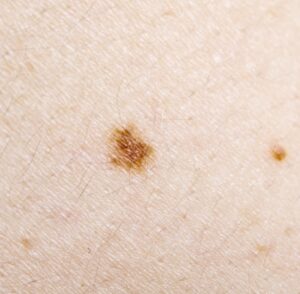What is Skin Cancer?

Skin cancer is quite simply, an abnormal growth of cells in the skin.
The skin is actually a complex organ that has a number of structures and serves a number of functions. As such, the skin is composed of a number of different types of cells that make up these structures and support these functions.
The keratinocyte is the main cell that makes up the skin surface and forms a barrier between the inside of the body and the external environment. Yet the skin also contain muscle and nerve cells that assist in the temperature regulation and sensation, pigment producing cells that allow the skin to tan, sweat and sebum producing adnexal and glandular cells, collagen producing fibroblasts, immune-regulating cells, to name just a few.
The truth is, any one of the cells can turn abnormal and turn into a cancerous growth. Some of these skin cancer though are seen more commonly than others.
The Most Common Types of Skin Cancer
Of the several types of cancerous growth in the skin, the most common are:
- Basal cell carcinoma
- Squamous cell carcinoma
- Melanoma
Basal Cell Carcinoma
Of all cancers, Basal cell carcinoma (BCC) is the most common in the United States. BCC are most often contiguous tumors, meaning they do not tend to break off, spread and metastasize int he body. Their damage is done by local destruction – they invade and impair into neighboring structures, like nerves, muscles, collagen and bone by burrowing their roots through and disrupting these tissues. BCC may look like:
- A bump that appears waxy or pearly
- A flat flesh-colored or brown scar-like lesion
- A sore that bleeds or scabs repeatably
- A scar-like plaque on the skin
Squamous Cell Carcinoma
The second most common cancer is Squamous cell carcinoma (SCC). SCC is slightly more aggressive that BCC, and can metastasize in certain situations. This is particularly true if the SCC has aggressive features, is poorly differentiated, and/or develops on high risk sites such as the ear or lip. SCC may look like:
- A firm, red nodule
- A lesion with a scaly, crusted surface
- A scaly pink patch on the skin
Melanoma
Melanoma is the most aggressive and dangerous form of these common skin cancers. Over time, melanoma will metastasize to the lymph nodes and internal organs. It is associated with a much higher mortality rate compared to BCC and SCC. Melanoma skin lesions look like the “ABCDE’s”:
- Asymmetry – one half of the shape does not match the other
- Border – ragged, blurred or irregular border
- Color – it has an uneven color and may have shades of black, brown and tan
- Diameter – the mole is bigger than 6 mm or changes in size (usually increased)
- Evolving – there has been a change in the mole over the past few weeks or months
Who is susceptible?
Anyone can get skin cancer, including dark-skinned people. In healthy populations, skin cancer is more common in Caucasians, however this does not mean that other ethnicities are immune to this disease. For example, melanoma can appear more frequently on the palms and soles of African Americans, and SCC can develop in burn scars. Transplants patients on immunosuppressive medication are at significantly increased risk for developing skin cancers. While certain groups of patients are definitely at higher risk, everyone should be vigilant at checking their skin for changing spots and suspicious skin lesions.
Treatment
A host of treatments are available to manage skin cancer. The treatment selected depends on a number of factors including type, area of the body involved, stage of the tumor, patient’s underlying health and others. The most common treatment for BCC and SCC is simple excision or Mohs surgery. Surgery is also primary treatment for melanoma to ensure the tumor is removed. Additional therapies might be indicated in certain situations and/or advanced disease.
Prevention
The primary cause of skin cancer is sunlight, specifically ultraviolet light (UV). The best prevention is to limit exposure to UV. When going into the sunlight, use a broad spectrum sunscreen with an SPF of at least 30 on all exposed skin. Also, wear wide-brim hats, long sleeves, long pants, and UV filtering sunglasses. Try to pan activities in the morning or late afternoon, so you are not exposed to the midday sun. Tanning beds expose the skin to excessive amount of damaging UV light and have been labelled as carcinogenic (cancer causing) by the Food and Drug Administration in the United States. They should be avoided.
Summary
Skin cancers are the most common cancers that effect humans. Many believe they are also the most preventable cancers and can be avoided simply through lifestyle modifications and limiting sun and UV light exposures. Treatment is the easiest and has the best outcomes when these cancers are detected early, one of the reasons the American Academy of Dermatology recommends everyone get a yearly skin screening examination by a dermatologist or qualified healthcare professional.
Questions?
To make an appointment or if you have questions, contact me.
Previous Post Next Post